Oncologist Resume Examples

Jul 18, 2024
|
12 min read
Master the art of crafting an oncologist resume: diagnose your strengths, cure your weaknesses, and impress hiring managers with your specialized skills and compassionate experience.
Rated by 348 people
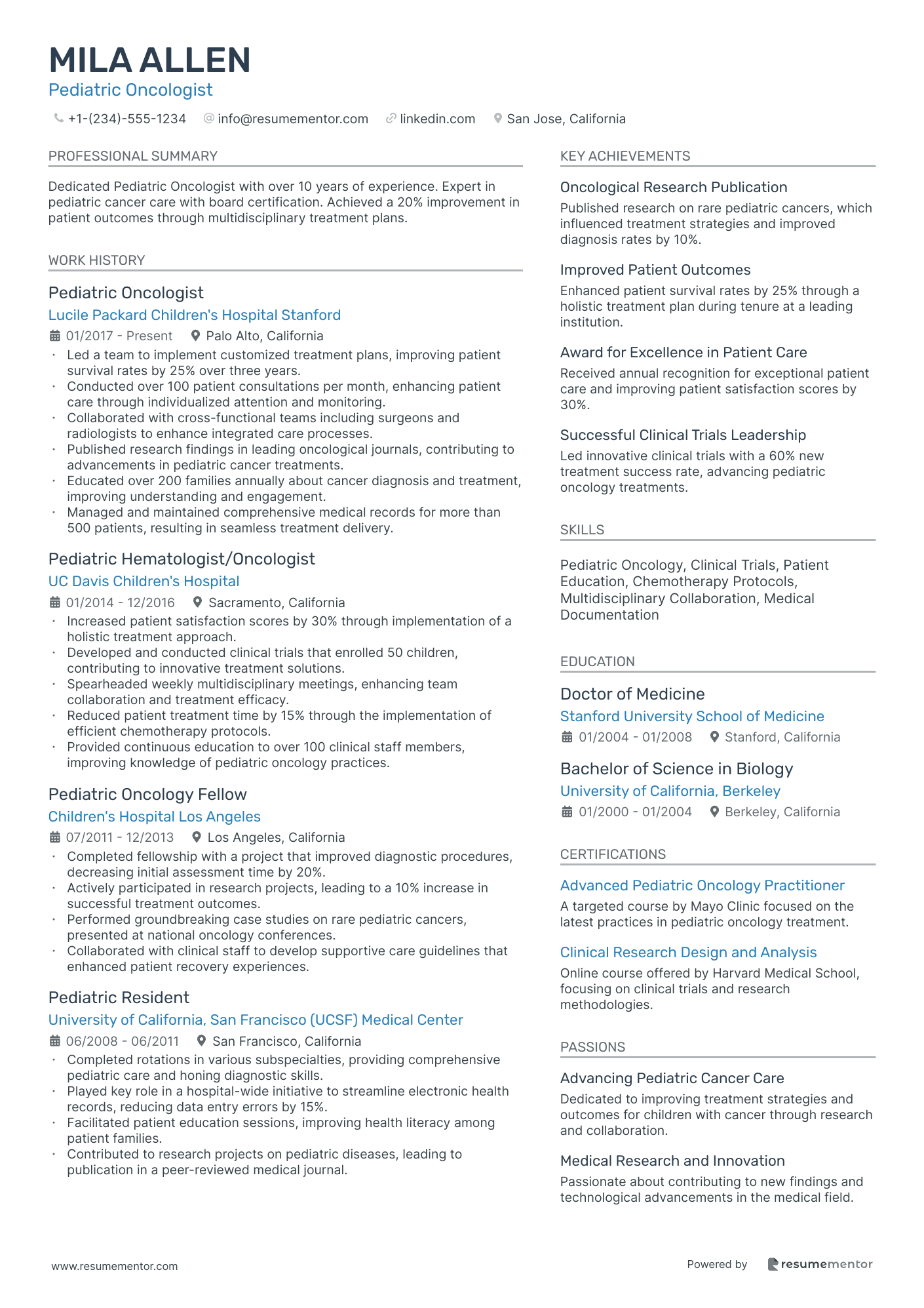
Pediatric Oncologist
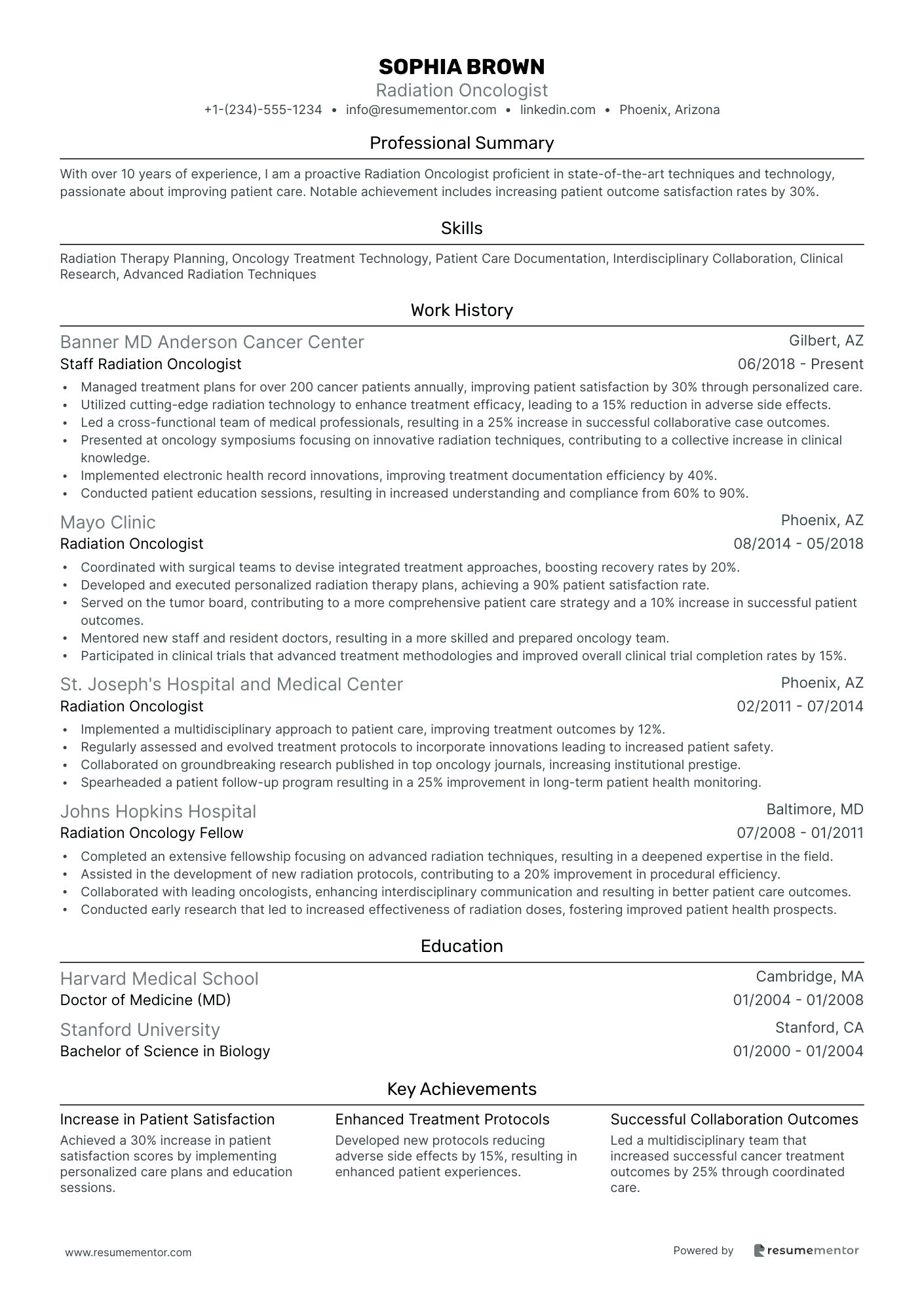
Radiation Oncologist
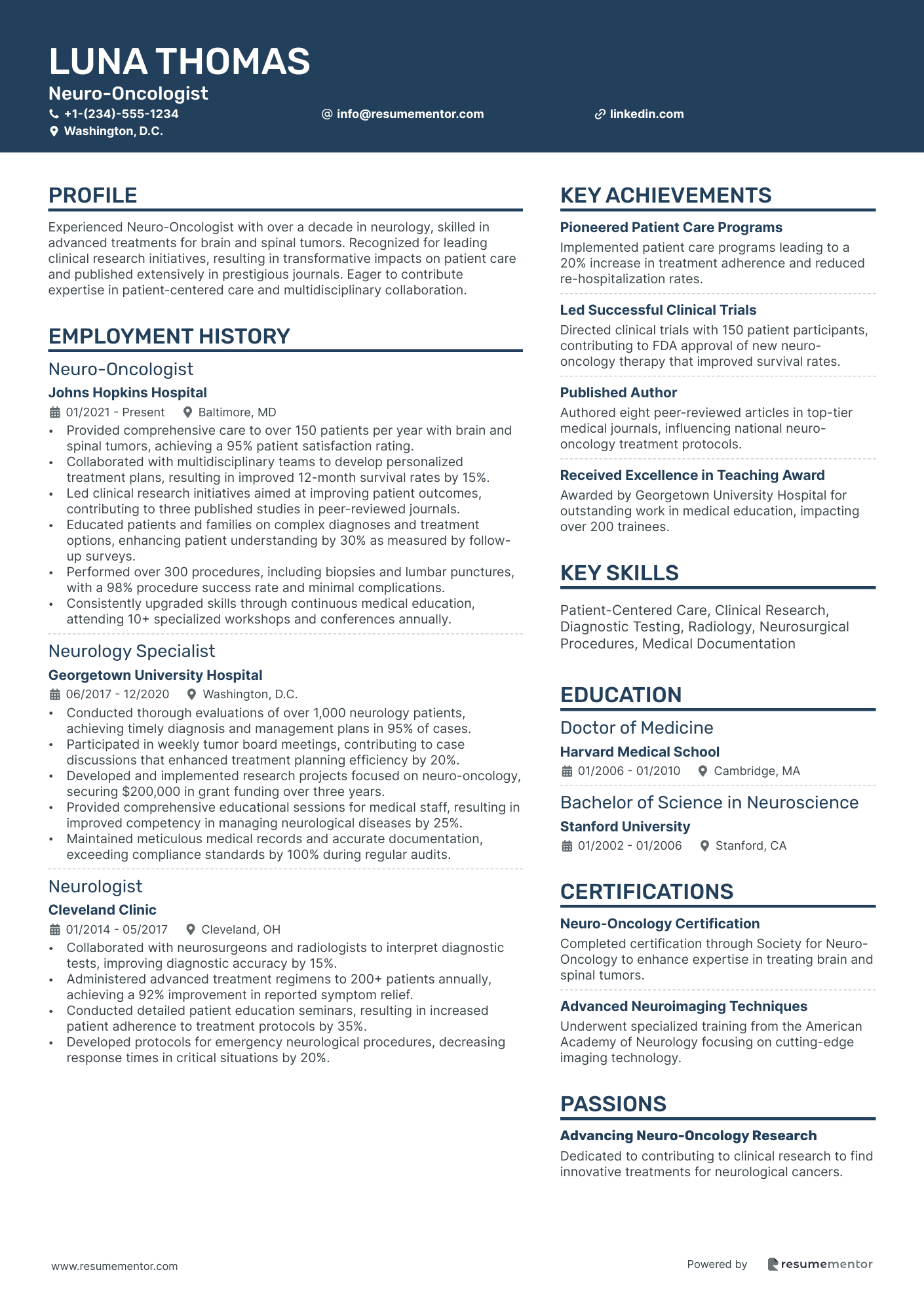
Neuro-Oncologist
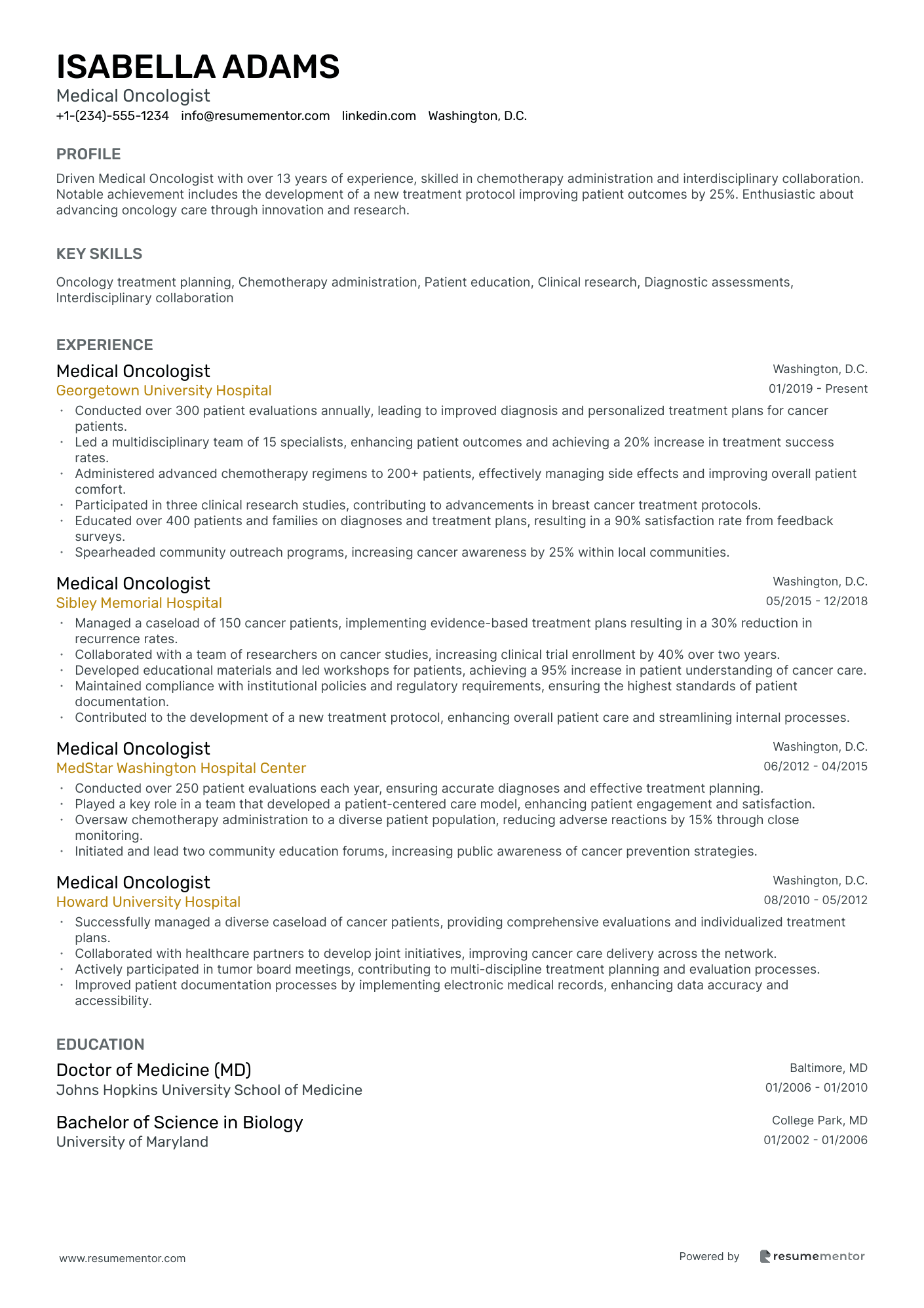
Medical Oncologist
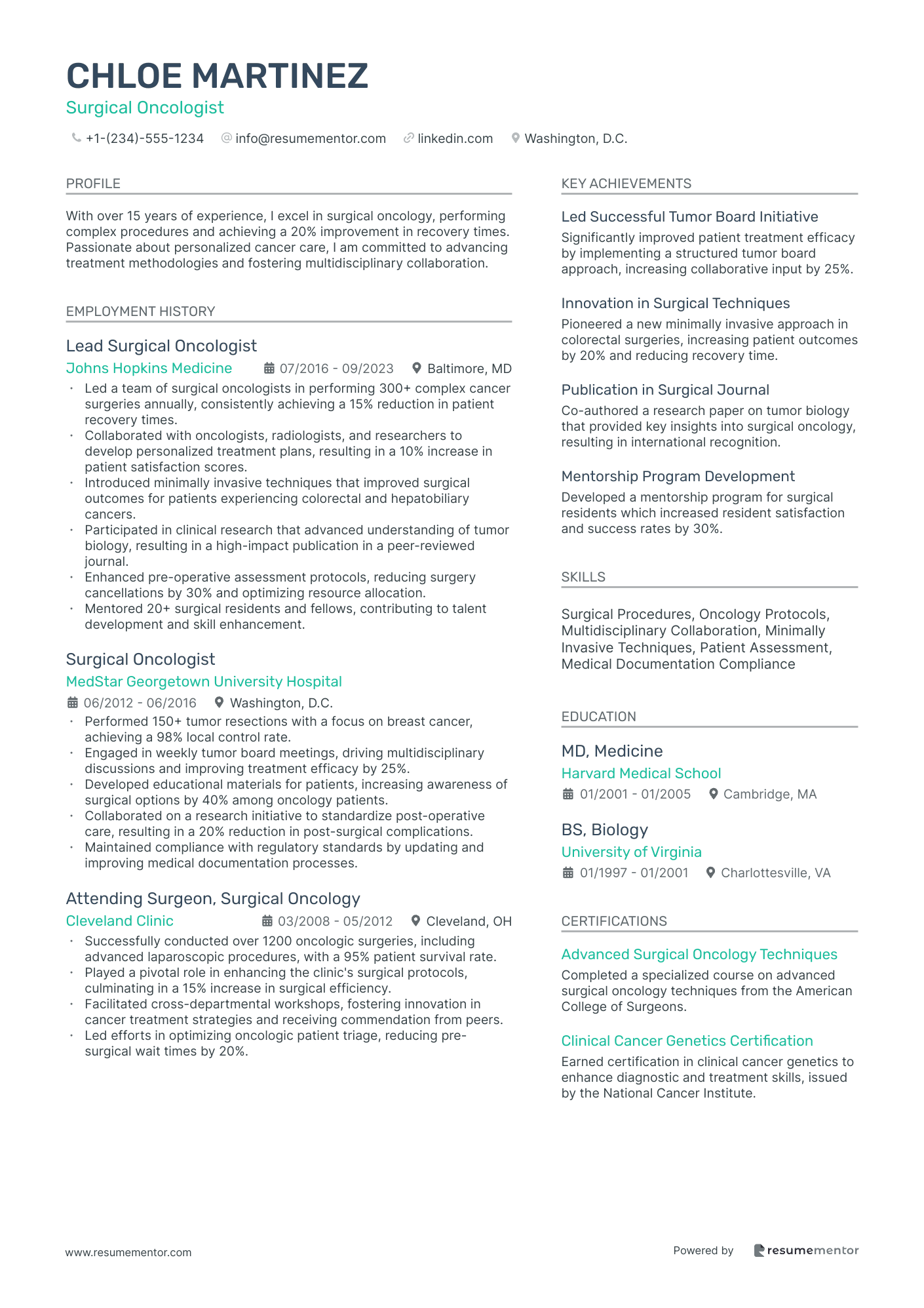
Surgical Oncologist
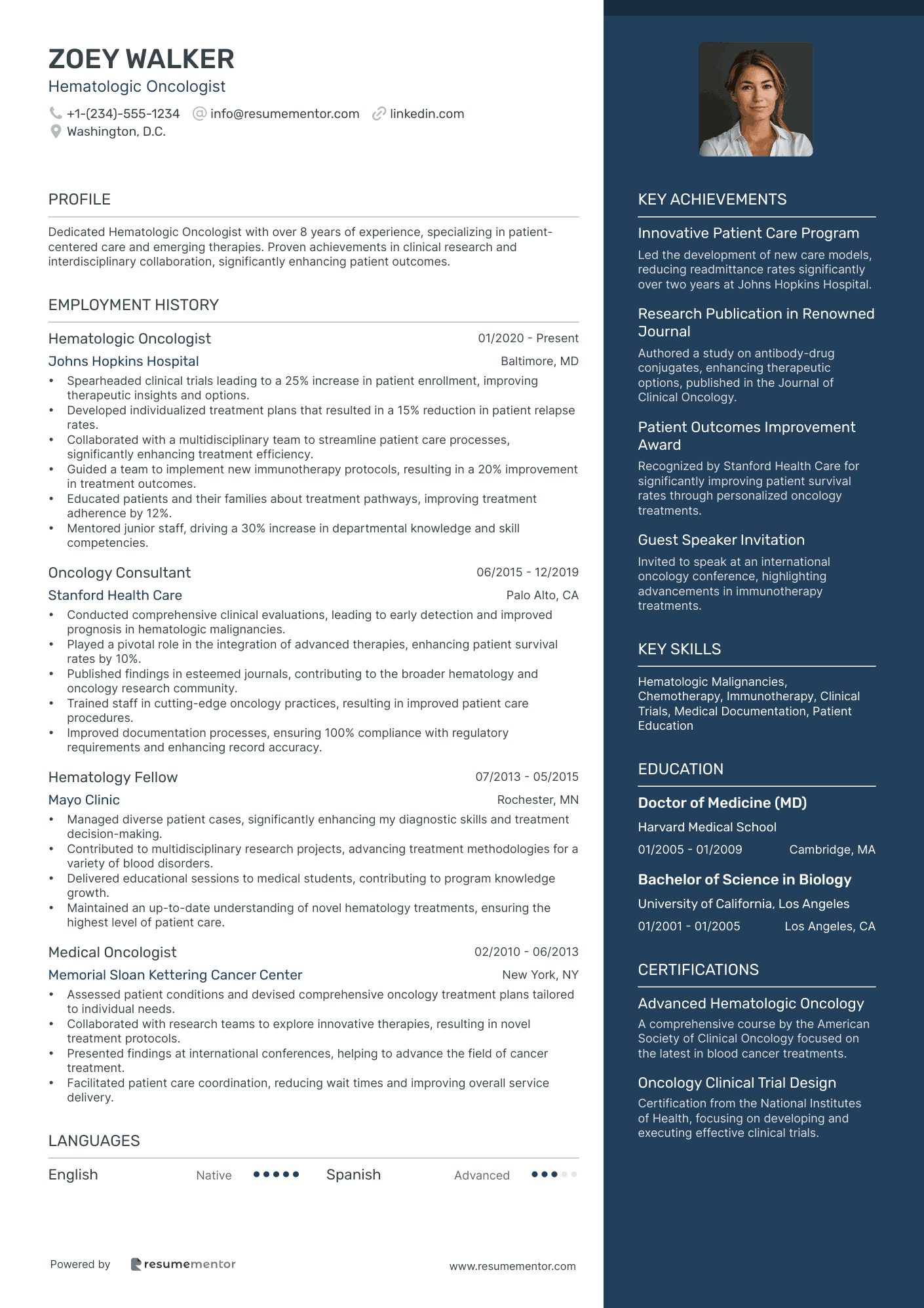
Hematologic Oncologist
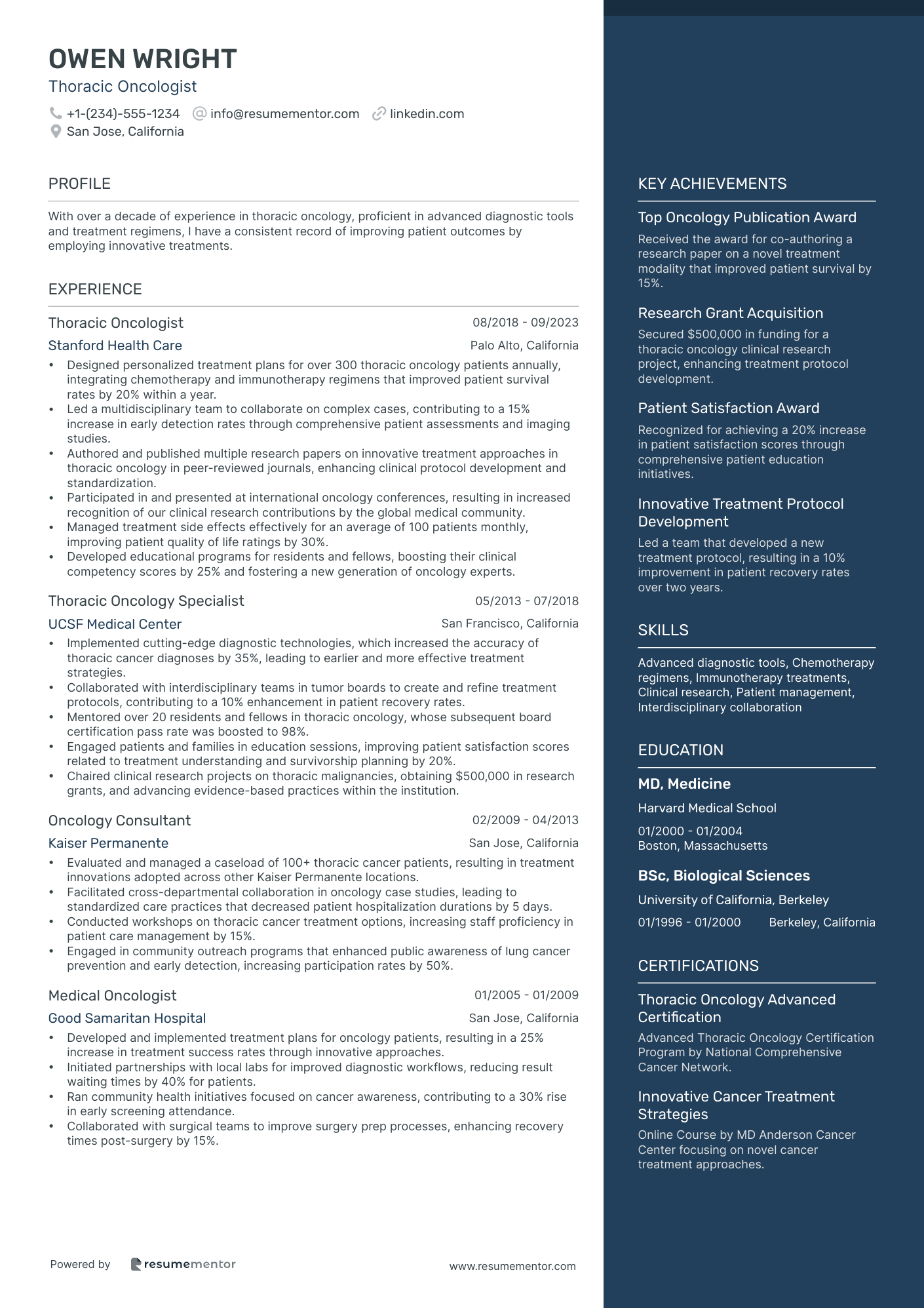
Thoracic Oncologist
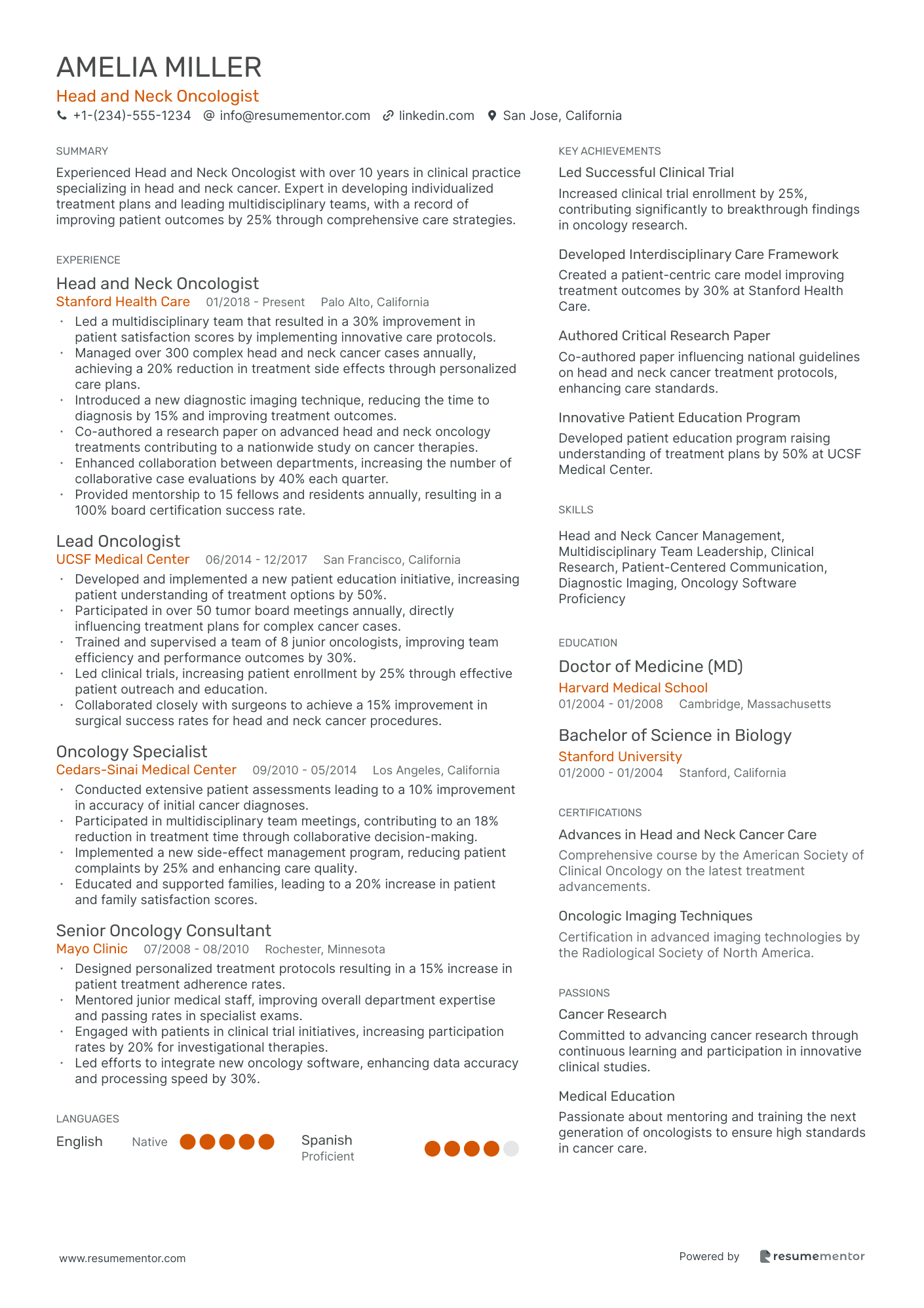
Head and Neck Oncologist
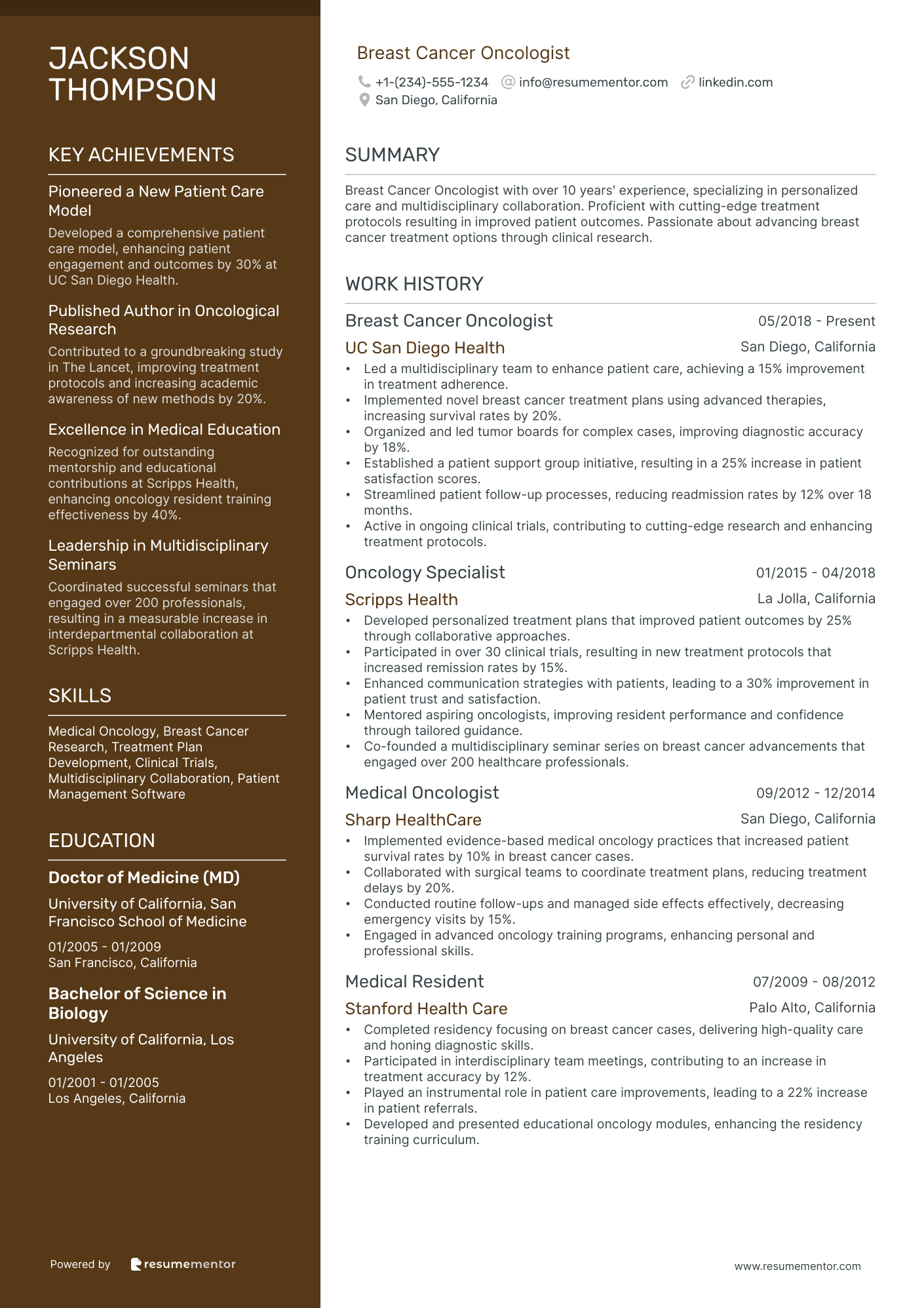
Breast Cancer Oncologist

Pediatric Oncologist resume sample
- •Led a team to implement customized treatment plans, improving patient survival rates by 25% over three years.
- •Conducted over 100 patient consultations per month, enhancing patient care through individualized attention and monitoring.
- •Collaborated with cross-functional teams including surgeons and radiologists to enhance integrated care processes.
- •Published research findings in leading oncological journals, contributing to advancements in pediatric cancer treatments.
- •Educated over 200 families annually about cancer diagnosis and treatment, improving understanding and engagement.
- •Managed and maintained comprehensive medical records for more than 500 patients, resulting in seamless treatment delivery.
- •Increased patient satisfaction scores by 30% through implementation of a holistic treatment approach.
- •Developed and conducted clinical trials that enrolled 50 children, contributing to innovative treatment solutions.
- •Spearheaded weekly multidisciplinary meetings, enhancing team collaboration and treatment efficacy.
- •Reduced patient treatment time by 15% through the implementation of efficient chemotherapy protocols.
- •Provided continuous education to over 100 clinical staff members, improving knowledge of pediatric oncology practices.
- •Completed fellowship with a project that improved diagnostic procedures, decreasing initial assessment time by 20%.
- •Actively participated in research projects, leading to a 10% increase in successful treatment outcomes.
- •Performed groundbreaking case studies on rare pediatric cancers, presented at national oncology conferences.
- •Collaborated with clinical staff to develop supportive care guidelines that enhanced patient recovery experiences.
- •Completed rotations in various subspecialties, providing comprehensive pediatric care and honing diagnostic skills.
- •Played key role in a hospital-wide initiative to streamline electronic health records, reducing data entry errors by 15%.
- •Facilitated patient education sessions, improving health literacy among patient families.
- •Contributed to research projects on pediatric diseases, leading to publication in a peer-reviewed medical journal.
Radiation Oncologist resume sample
- •Managed treatment plans for over 200 cancer patients annually, improving patient satisfaction by 30% through personalized care.
- •Utilized cutting-edge radiation technology to enhance treatment efficacy, leading to a 15% reduction in adverse side effects.
- •Led a cross-functional team of medical professionals, resulting in a 25% increase in successful collaborative case outcomes.
- •Presented at oncology symposiums focusing on innovative radiation techniques, contributing to a collective increase in clinical knowledge.
- •Implemented electronic health record innovations, improving treatment documentation efficiency by 40%.
- •Conducted patient education sessions, resulting in increased understanding and compliance from 60% to 90%.
- •Coordinated with surgical teams to devise integrated treatment approaches, boosting recovery rates by 20%.
- •Developed and executed personalized radiation therapy plans, achieving a 90% patient satisfaction rate.
- •Served on the tumor board, contributing to a more comprehensive patient care strategy and a 10% increase in successful patient outcomes.
- •Mentored new staff and resident doctors, resulting in a more skilled and prepared oncology team.
- •Participated in clinical trials that advanced treatment methodologies and improved overall clinical trial completion rates by 15%.
- •Implemented a multidisciplinary approach to patient care, improving treatment outcomes by 12%.
- •Regularly assessed and evolved treatment protocols to incorporate innovations leading to increased patient safety.
- •Collaborated on groundbreaking research published in top oncology journals, increasing institutional prestige.
- •Spearheaded a patient follow-up program resulting in a 25% improvement in long-term patient health monitoring.
- •Completed an extensive fellowship focusing on advanced radiation techniques, resulting in a deepened expertise in the field.
- •Assisted in the development of new radiation protocols, contributing to a 20% improvement in procedural efficiency.
- •Collaborated with leading oncologists, enhancing interdisciplinary communication and resulting in better patient care outcomes.
- •Conducted early research that led to increased effectiveness of radiation doses, fostering improved patient health prospects.
Neuro-Oncologist resume sample
- •Provided comprehensive care to over 150 patients per year with brain and spinal tumors, achieving a 95% patient satisfaction rating.
- •Collaborated with multidisciplinary teams to develop personalized treatment plans, resulting in improved 12-month survival rates by 15%.
- •Led clinical research initiatives aimed at improving patient outcomes, contributing to three published studies in peer-reviewed journals.
- •Educated patients and families on complex diagnoses and treatment options, enhancing patient understanding by 30% as measured by follow-up surveys.
- •Performed over 300 procedures, including biopsies and lumbar punctures, with a 98% procedure success rate and minimal complications.
- •Consistently upgraded skills through continuous medical education, attending 10+ specialized workshops and conferences annually.
- •Conducted thorough evaluations of over 1,000 neurology patients, achieving timely diagnosis and management plans in 95% of cases.
- •Participated in weekly tumor board meetings, contributing to case discussions that enhanced treatment planning efficiency by 20%.
- •Developed and implemented research projects focused on neuro-oncology, securing $200,000 in grant funding over three years.
- •Provided comprehensive educational sessions for medical staff, resulting in improved competency in managing neurological diseases by 25%.
- •Maintained meticulous medical records and accurate documentation, exceeding compliance standards by 100% during regular audits.
- •Collaborated with neurosurgeons and radiologists to interpret diagnostic tests, improving diagnostic accuracy by 15%.
- •Administered advanced treatment regimens to 200+ patients annually, achieving a 92% improvement in reported symptom relief.
- •Conducted detailed patient education seminars, resulting in increased patient adherence to treatment protocols by 35%.
- •Developed protocols for emergency neurological procedures, decreasing response times in critical situations by 20%.
- •Completed over 1,500 hours of clinical rotations in neurology, receiving top assessments for patient care excellence.
- •Engaged in rounds and case discussions that improved team diagnostic capabilities, leading to a 10% improvement in treatment outcomes.
- •Participated in research on neurological disorders, publishing findings that influenced treatment guidelines internationally.
- •Trained junior residents on neurological examination techniques, enhancing departmental educational standards.
Medical Oncologist resume sample
- •Conducted over 300 patient evaluations annually, leading to improved diagnosis and personalized treatment plans for cancer patients.
- •Led a multidisciplinary team of 15 specialists, enhancing patient outcomes and achieving a 20% increase in treatment success rates.
- •Administered advanced chemotherapy regimens to 200+ patients, effectively managing side effects and improving overall patient comfort.
- •Participated in three clinical research studies, contributing to advancements in breast cancer treatment protocols.
- •Educated over 400 patients and families on diagnoses and treatment plans, resulting in a 90% satisfaction rate from feedback surveys.
- •Spearheaded community outreach programs, increasing cancer awareness by 25% within local communities.
- •Managed a caseload of 150 cancer patients, implementing evidence-based treatment plans resulting in a 30% reduction in recurrence rates.
- •Collaborated with a team of researchers on cancer studies, increasing clinical trial enrollment by 40% over two years.
- •Developed educational materials and led workshops for patients, achieving a 95% increase in patient understanding of cancer care.
- •Maintained compliance with institutional policies and regulatory requirements, ensuring the highest standards of patient documentation.
- •Contributed to the development of a new treatment protocol, enhancing overall patient care and streamlining internal processes.
- •Conducted over 250 patient evaluations each year, ensuring accurate diagnoses and effective treatment planning.
- •Played a key role in a team that developed a patient-centered care model, enhancing patient engagement and satisfaction.
- •Oversaw chemotherapy administration to a diverse patient population, reducing adverse reactions by 15% through close monitoring.
- •Initiated and lead two community education forums, increasing public awareness of cancer prevention strategies.
- •Successfully managed a diverse caseload of cancer patients, providing comprehensive evaluations and individualized treatment plans.
- •Collaborated with healthcare partners to develop joint initiatives, improving cancer care delivery across the network.
- •Actively participated in tumor board meetings, contributing to multi-discipline treatment planning and evaluation processes.
- •Improved patient documentation processes by implementing electronic medical records, enhancing data accuracy and accessibility.
Surgical Oncologist resume sample
- •Led a team of surgical oncologists in performing 300+ complex cancer surgeries annually, consistently achieving a 15% reduction in patient recovery times.
- •Collaborated with oncologists, radiologists, and researchers to develop personalized treatment plans, resulting in a 10% increase in patient satisfaction scores.
- •Introduced minimally invasive techniques that improved surgical outcomes for patients experiencing colorectal and hepatobiliary cancers.
- •Participated in clinical research that advanced understanding of tumor biology, resulting in a high-impact publication in a peer-reviewed journal.
- •Enhanced pre-operative assessment protocols, reducing surgery cancellations by 30% and optimizing resource allocation.
- •Mentored 20+ surgical residents and fellows, contributing to talent development and skill enhancement.
- •Performed 150+ tumor resections with a focus on breast cancer, achieving a 98% local control rate.
- •Engaged in weekly tumor board meetings, driving multidisciplinary discussions and improving treatment efficacy by 25%.
- •Developed educational materials for patients, increasing awareness of surgical options by 40% among oncology patients.
- •Collaborated on a research initiative to standardize post-operative care, resulting in a 20% reduction in post-surgical complications.
- •Maintained compliance with regulatory standards by updating and improving medical documentation processes.
- •Successfully conducted over 1200 oncologic surgeries, including advanced laparoscopic procedures, with a 95% patient survival rate.
- •Played a pivotal role in enhancing the clinic's surgical protocols, culminating in a 15% increase in surgical efficiency.
- •Facilitated cross-departmental workshops, fostering innovation in cancer treatment strategies and receiving commendation from peers.
- •Led efforts in optimizing oncologic patient triage, reducing pre-surgical wait times by 20%.
- •Completed residency with extensive training in surgical oncology, with a focus on GI tract malignancies.
- •Assisted in over 200 surgical procedures, gaining invaluable hands-on experience and contributing to a 90% success rate.
- •Conducted research in surgical oncology, contributing to a peer-reviewed publication on personalized cancer therapies.
- •Proactively engaged in patient care initiatives, resulting in enhanced patient experience scores by 15%.
Hematologic Oncologist resume sample
- •Spearheaded clinical trials leading to a 25% increase in patient enrollment, improving therapeutic insights and options.
- •Developed individualized treatment plans that resulted in a 15% reduction in patient relapse rates.
- •Collaborated with a multidisciplinary team to streamline patient care processes, significantly enhancing treatment efficiency.
- •Guided a team to implement new immunotherapy protocols, resulting in a 20% improvement in treatment outcomes.
- •Educated patients and their families about treatment pathways, improving treatment adherence by 12%.
- •Mentored junior staff, driving a 30% increase in departmental knowledge and skill competencies.
- •Conducted comprehensive clinical evaluations, leading to early detection and improved prognosis in hematologic malignancies.
- •Played a pivotal role in the integration of advanced therapies, enhancing patient survival rates by 10%.
- •Published findings in esteemed journals, contributing to the broader hematology and oncology research community.
- •Trained staff in cutting-edge oncology practices, resulting in improved patient care procedures.
- •Improved documentation processes, ensuring 100% compliance with regulatory requirements and enhancing record accuracy.
- •Managed diverse patient cases, significantly enhancing my diagnostic skills and treatment decision-making.
- •Contributed to multidisciplinary research projects, advancing treatment methodologies for a variety of blood disorders.
- •Delivered educational sessions to medical students, contributing to program knowledge growth.
- •Maintained an up-to-date understanding of novel hematology treatments, ensuring the highest level of patient care.
- •Assessed patient conditions and devised comprehensive oncology treatment plans tailored to individual needs.
- •Collaborated with research teams to explore innovative therapies, resulting in novel treatment protocols.
- •Presented findings at international conferences, helping to advance the field of cancer treatment.
- •Facilitated patient care coordination, reducing wait times and improving overall service delivery.
Thoracic Oncologist resume sample
- •Designed personalized treatment plans for over 300 thoracic oncology patients annually, integrating chemotherapy and immunotherapy regimens that improved patient survival rates by 20% within a year.
- •Led a multidisciplinary team to collaborate on complex cases, contributing to a 15% increase in early detection rates through comprehensive patient assessments and imaging studies.
- •Authored and published multiple research papers on innovative treatment approaches in thoracic oncology in peer-reviewed journals, enhancing clinical protocol development and standardization.
- •Participated in and presented at international oncology conferences, resulting in increased recognition of our clinical research contributions by the global medical community.
- •Managed treatment side effects effectively for an average of 100 patients monthly, improving patient quality of life ratings by 30%.
- •Developed educational programs for residents and fellows, boosting their clinical competency scores by 25% and fostering a new generation of oncology experts.
- •Implemented cutting-edge diagnostic technologies, which increased the accuracy of thoracic cancer diagnoses by 35%, leading to earlier and more effective treatment strategies.
- •Collaborated with interdisciplinary teams in tumor boards to create and refine treatment protocols, contributing to a 10% enhancement in patient recovery rates.
- •Mentored over 20 residents and fellows in thoracic oncology, whose subsequent board certification pass rate was boosted to 98%.
- •Engaged patients and families in education sessions, improving patient satisfaction scores related to treatment understanding and survivorship planning by 20%.
- •Chaired clinical research projects on thoracic malignancies, obtaining $500,000 in research grants, and advancing evidence-based practices within the institution.
- •Evaluated and managed a caseload of 100+ thoracic cancer patients, resulting in treatment innovations adopted across other Kaiser Permanente locations.
- •Facilitated cross-departmental collaboration in oncology case studies, leading to standardized care practices that decreased patient hospitalization durations by 5 days.
- •Conducted workshops on thoracic cancer treatment options, increasing staff proficiency in patient care management by 15%.
- •Engaged in community outreach programs that enhanced public awareness of lung cancer prevention and early detection, increasing participation rates by 50%.
- •Developed and implemented treatment plans for oncology patients, resulting in a 25% increase in treatment success rates through innovative approaches.
- •Initiated partnerships with local labs for improved diagnostic workflows, reducing result waiting times by 40% for patients.
- •Ran community health initiatives focused on cancer awareness, contributing to a 30% rise in early screening attendance.
- •Collaborated with surgical teams to improve surgery prep processes, enhancing recovery times post-surgery by 15%.
Head and Neck Oncologist resume sample
- •Led a multidisciplinary team that resulted in a 30% improvement in patient satisfaction scores by implementing innovative care protocols.
- •Managed over 300 complex head and neck cancer cases annually, achieving a 20% reduction in treatment side effects through personalized care plans.
- •Introduced a new diagnostic imaging technique, reducing the time to diagnosis by 15% and improving treatment outcomes.
- •Co-authored a research paper on advanced head and neck oncology treatments contributing to a nationwide study on cancer therapies.
- •Enhanced collaboration between departments, increasing the number of collaborative case evaluations by 40% each quarter.
- •Provided mentorship to 15 fellows and residents annually, resulting in a 100% board certification success rate.
- •Developed and implemented a new patient education initiative, increasing patient understanding of treatment options by 50%.
- •Participated in over 50 tumor board meetings annually, directly influencing treatment plans for complex cancer cases.
- •Trained and supervised a team of 8 junior oncologists, improving team efficiency and performance outcomes by 30%.
- •Led clinical trials, increasing patient enrollment by 25% through effective patient outreach and education.
- •Collaborated closely with surgeons to achieve a 15% improvement in surgical success rates for head and neck cancer procedures.
- •Conducted extensive patient assessments leading to a 10% improvement in accuracy of initial cancer diagnoses.
- •Participated in multidisciplinary team meetings, contributing to an 18% reduction in treatment time through collaborative decision-making.
- •Implemented a new side-effect management program, reducing patient complaints by 25% and enhancing care quality.
- •Educated and supported families, leading to a 20% increase in patient and family satisfaction scores.
- •Designed personalized treatment protocols resulting in a 15% increase in patient treatment adherence rates.
- •Mentored junior medical staff, improving overall department expertise and passing rates in specialist exams.
- •Engaged with patients in clinical trial initiatives, increasing participation rates by 20% for investigational therapies.
- •Led efforts to integrate new oncology software, enhancing data accuracy and processing speed by 30%.
Breast Cancer Oncologist resume sample
- •Led a multidisciplinary team to enhance patient care, achieving a 15% improvement in treatment adherence.
- •Implemented novel breast cancer treatment plans using advanced therapies, increasing survival rates by 20%.
- •Organized and led tumor boards for complex cases, improving diagnostic accuracy by 18%.
- •Established a patient support group initiative, resulting in a 25% increase in patient satisfaction scores.
- •Streamlined patient follow-up processes, reducing readmission rates by 12% over 18 months.
- •Active in ongoing clinical trials, contributing to cutting-edge research and enhancing treatment protocols.
- •Developed personalized treatment plans that improved patient outcomes by 25% through collaborative approaches.
- •Participated in over 30 clinical trials, resulting in new treatment protocols that increased remission rates by 15%.
- •Enhanced communication strategies with patients, leading to a 30% improvement in patient trust and satisfaction.
- •Mentored aspiring oncologists, improving resident performance and confidence through tailored guidance.
- •Co-founded a multidisciplinary seminar series on breast cancer advancements that engaged over 200 healthcare professionals.
- •Implemented evidence-based medical oncology practices that increased patient survival rates by 10% in breast cancer cases.
- •Collaborated with surgical teams to coordinate treatment plans, reducing treatment delays by 20%.
- •Conducted routine follow-ups and managed side effects effectively, decreasing emergency visits by 15%.
- •Engaged in advanced oncology training programs, enhancing personal and professional skills.
- •Completed residency focusing on breast cancer cases, delivering high-quality care and honing diagnostic skills.
- •Participated in interdisciplinary team meetings, contributing to an increase in treatment accuracy by 12%.
- •Played an instrumental role in patient care improvements, leading to a 22% increase in patient referrals.
- •Developed and presented educational oncology modules, enhancing the residency training curriculum.
Crafting a compelling resume as an oncologist can feel like navigating an uncharted path. Your journey in cancer care is full of valuable experience and complex cases, but capturing this on paper can be daunting. In the world of oncology, where every detail counts, effectively highlighting your skills, compassion, and achievements is crucial.
Condensing years of training and practice into a few pages is no easy task, especially when your clinical expertise, research endeavors, and leadership roles are all essential components. You need a way to organize these elements without losing the essence of your unique story. This is where a clear template comes into play, offering a streamlined process to ensure nothing gets overlooked. Check out different resume templates to get started.
A professional template not only saves time but also structures your resume logically, increasing its chances of catching the attention of hiring managers. It helps you arrange your education, work history, and specialized training clearly, making your potential undeniable. In the specialized field of oncology, presenting a well-rounded resume can be your edge in standing out.
This guide is here to simplify the process, equipping you with practical advice to create a resume that truly reflects your dedication and expertise in the dynamic world of oncology. Let’s turn your resume into your strongest ally as you pursue the next milestone in your career.
Key Takeaways
- Begin your resume with a strong professional summary tailored to highlight key achievements and skills relevant to the job.
- Use a clear template to organize sections logically, ensuring all crucial aspects like medical licensure, education, and clinical experience are effectively showcased.
- Incorporate research and publications to demonstrate dedication to advancing oncology, and include details of continuous education and professional development.
- Choose a chronological resume format, select a modern font, and save your resume as a PDF to ensure a professional appearance across devices.
- Add extra sections such as certificates, language proficiency, volunteer work, and books to present a well-rounded view of your professional and personal skills.
What to focus on when writing your oncologist resume
An oncologist's resume should clearly communicate your medical expertise and deep commitment to patient care, effectively demonstrating your ability to treat cancer. It's important to highlight your skills in diagnosing and managing various cancers while also emphasizing your dedication to ongoing research and professional growth.
How to structure your oncologist resume
- Professional Summary: Start with a strong statement about your years of experience, specific areas of expertise, and unwavering dedication to compassionate care—this section sets the tone for the rest of the resume. Tailor this part to your unique career path by focusing on key skills and achievements that align closely with the job description, such as patient outcomes, leadership in care teams, or personalized treatment plans. This introduction helps the recruiter quickly assess how you stand out.
- Medical Licensure and Certifications: Follow with your board certifications and medical licenses, such as the American Board of Oncology certification, to underscore your professional qualifications and trustworthiness. Clearly listing these credentials ensures compliance with essential job requirements and gives recruiters confidence in your ability to deliver high-standard care. Specify any state licenses or continuing education efforts that signal your readiness to work in various clinical settings.
- Education: Build on this by including your medical degree and specialized oncology training, providing details about the institutions and graduation dates to give a complete picture of your educational background. This section not only outlines your foundational expertise but also aligns your academic achievements with practical experiences. Emphasize any honors, relevant coursework, or thesis topics that reflect your deep understanding of oncology.
- Clinical Experience: Next, outline your past clinical roles by detailing the types of cancer you’ve treated and any leadership positions you’ve held in multidisciplinary teams. Illustrating your hands-on experience here depicts how you've applied your skills practically, influencing patient care and team dynamics. Describe specific methodologies or technologies you've used to innovate treatment plans or enhance patient outcomes.
- Research and Publications: Continue with any research projects, published papers, or clinical trials you’ve been involved in, which demonstrate your active contribution to advancing the field of oncology. Highlighting this area not only portrays your dedication to scientific progress but also shows potential employers your personal investment in staying at the forefront of medical advancements. Mention collaborations, publications in peer-reviewed journals, or presentations at industry conferences to showcase your commitment to scholarly contributions.
- Continuous Education and Professional Development: Conclude with details about fellowships, seminars, or workshops you’ve attended, highlighting your commitment to staying updated with medical advancements—this section reinforces your dedication to ongoing professional growth and adaptability in a rapidly evolving field. As we transition into discussing resume format, we'll cover each section more in-depth to ensure your resume effectively captures your unique qualifications and professional journey.
Which resume format to choose
Creating a strong resume as an oncologist involves seamlessly blending several key elements to effectively present your professional story. Let's dive into each aspect that will make your resume stand out.
The chronological format is your go-to structure; it highlights your experience and milestones in oncology, showing a clear progression in your career. This format makes it easy for employers to see your trajectory and determine if you're the right fit for their team.
Choosing the right font is a subtle yet important detail. Opt for Montserrat, Lato, or Raleway. These fonts offer a modern, clean look that enhances readability without distracting from your accomplishments. They help to convey professionalism and attention to detail, both crucial traits in the medical field.
Saving your resume as a PDF cannot be overstated. This file type locks in your formatting, ensuring that your resume looks the same on all devices. This consistency is key to maintaining a professional appearance, as you want to make a great impression no matter where or how your resume is viewed.
Pay attention to your document's layout by setting your margins to one inch. This creates adequate white space, which keeps the resume organized and easy to read. A well-structured page allows your skills and achievements in oncology to take center stage without overwhelming the reader.
By thoughtfully addressing these components, you craft a resume that reflects both your professional journey and your skills in oncology with clarity and style.
How to write a quantifiable resume experience section
Crafting a strong experience section is key for making an impression as an oncologist. It highlights your skills and achievements, providing employers a clear picture of your impact in the field. Focus on outcomes you've influenced, such as patient care improvements and enhanced efficiency. Start with the most recent role in reverse chronological order, covering the last 10-15 years to show sustained expertise and growth. Include job titles that reflect your progression in oncology. To make your resume even more compelling, tailor each version to the specific job ad. Use terms from the posting to align with the employer's needs and emphasize your contributions with action words like "improved," "developed," "reduced," or "led."
- •Boosted patient satisfaction scores by 30% in two years through enhanced communication and personalized care plans.
- •Led a team of 20 oncology specialists, cutting treatment waiting times by 40% with process improvements and strategic scheduling.
- •Created an innovative patient monitoring system, increasing early complication detection by 25% for better patient outcomes.
- •Secured $5 million in research funding by spearheading a clinical trial partnership for advanced treatment options.
This experience section stands out by clearly connecting your role and the positive changes you've driven. By highlighting measurable achievements, it demonstrates your ability to make a real difference, like significantly boosting patient satisfaction and reducing wait times. This reflects both leadership and innovative thinking, qualities that employers value. Each bullet point is crafted to show how your efforts align with key outcomes they are seeking, making your resume more compelling. Tailoring each application to the job requirements further enhances its effectiveness, helping you secure the role you desire.
Problem-Solving Focused resume experience section
A problem-solving-focused oncologist resume experience section should effectively convey how you address and overcome challenges in your field. Begin by detailing scenarios where you spotted complex issues and devised successful solutions. Explain how your actions contributed to improved patient outcomes or enhanced the efficiency of your department. Clearly illustrate your role in these accomplishments, whether it involved mentoring a team or spearheading innovative treatment strategies. Highlight your ability to communicate complex medical concepts to patients and colleagues, as this skill is crucial for building trust and promoting treatment adherence.
In your bullet points, seamlessly integrate examples of your problem-solving expertise. Describe the challenges faced, the actions you took, and the positive results achieved. Include examples of how your contributions led to improved patient recovery rates or influenced advancements in treatment protocols. Emphasize your collaborations with other medical professionals or departments to effectively tackle obstacles. Your objective is to weave a cohesive narrative that showcases your critical thinking and the significant impact you've made on patient care.
Oncologist
City Hospital
January 2018 - Present
- Led a cross-functional team to develop a new treatment protocol, reducing patient recovery time by 15%.
- Implemented a patient education program that improved treatment adherence rates by 20%.
- Collaborated with research department to incorporate new cancer therapies, enhancing patient survival outcomes.
- Streamlined chemotherapy scheduling process, improving patient access and reducing wait times.
Collaboration-Focused resume experience section
A Collaboration-Focused oncologist resume experience section should clearly demonstrate how your teamwork skills boost patient care. Reflect on your past roles where you've successfully enhanced healthcare through collaboration. Focus on specific instances where you led or participated in multidisciplinary teams, coordinated with other specialists, or improved communication across departments. Use action-oriented language to emphasize your active role in driving these cooperative efforts.
Consider times when your collaborative approach directly benefited patients and led to better clinical outcomes. Whether you led a tumor board meeting that resulted in crucial treatment decisions or implemented protocols for more efficient team consultations, these experiences show your ability to unite resources for the greater good. Your resume should reflect a strong history of bringing together people and tools to make a meaningful impact on patient care.
Oncologist
City Healthcare Center
Jan 2019 - Present
- Led a multidisciplinary team to streamline patient referrals, reducing wait times by 20%.
- Coordinated monthly cross-department meetings to optimize treatment plans and improve communication.
- Introduced a patient information portal that enhanced the sharing of clinical data among specialists.
- Spearheaded a partnership with a local radiology team, which resulted in improved diagnostic accuracy.
Industry-Specific Focus resume experience section
A cancer-treatment-focused oncologist resume experience section should highlight your skills and achievements in managing patient care effectively. Showcase your expertise in diagnosing and treating various cancer types while working seamlessly with a healthcare team. Emphasize your involvement in research projects or notable breakthroughs, illustrating your active role in advancing the field of oncology. Organize your experience in clear chronological order and connect past experiences to the role you are targeting.
When detailing your experience, use concise bullet points that capture your key achievements and responsibilities, providing specific examples where possible. Illustrate the positive outcomes of your work, such as improved patient recovery rates or the success of treatment plans, to demonstrate your effectiveness as a medical professional. Include any advanced training or certifications that enhance your qualifications as an oncologist, drawing a clear line between your skills and their impact on patient care.
Senior Oncologist
City Hospital
June 2018 - Present
- Developed personalized treatment plans for over 300 cancer patients, improving recovery rates by 20%.
- Collaborated with a multidisciplinary team to enhance patient care and integrate the latest research findings.
- Led clinical trials for novel cancer treatments, contributing to groundbreaking advancements in oncology.
- Mentored and trained junior oncologists, fostering a culture of continuous learning and excellence.
Training and Development Focused resume experience section
A training and development-focused oncologist resume experience section should clearly highlight your achievements, showcasing your ability to mentor and guide others in your field. Begin by listing your job title, dates of employment, and where you worked. If needed, briefly describe your workplace to provide context. Your bullet points should clearly reflect your involvement in training programs and professional development activities, emphasizing the positive impact you've made.
To make your bullet points compelling, start each with a strong action verb and provide specific details. Demonstrate the scope of your responsibilities and achievements with simple, descriptive language. Emphasize results and include statistics when you can to highlight your influence. Each bullet should flow naturally into the next, showing not just what you accomplished but also the improvements that resulted, illustrating your ability to lead and foster growth in educational and mentoring settings.
Oncology Training Program Coordinator
Central Medical University
2020 - 2023
- Developed and implemented a comprehensive training curriculum for new oncology trainees, which led to a 20% increase in program completion rates.
- Drove knowledge enhancement by organizing monthly workshops on cutting-edge oncological treatments and research for participants.
- Fostered team development by mentoring a group of five junior oncologists, improving their skills in patient management and research techniques, and consequently boosting overall performance.
- Enhanced inter-departmental collaboration by working with multidisciplinary teams to create an innovative training protocol that improved communication and patient care efficiency.
Write your oncologist resume summary section
A results-focused oncologist resume should start with a summary that highlights your key skills and experiences seamlessly. If you're an oncologist with extensive experience, your summary should immediately convey your expertise and unique contributions. For instance, you could describe yourself like this:
This summary works because it immediately points out your certification and area of specialization, alongside your leadership in clinical trials, all of which set you apart. Using descriptors like "dedicated" or "innovative" helps underscore your approach to medicine and patient care.
Understanding different sections like the summary and resume objective is crucial. Where a summary tells the employer what you bring based on past successes, an objective shares what you hope to achieve in your next role. Experienced professionals often find summaries more effective as they highlight accomplishments, whereas objectives are useful for those just starting out to discuss aspirations.
A resume profile provides a narrative overview while a summary of qualifications typically highlights achievements in bullet points. Each has its place based on the story you're trying to tell. Choose a style that best reflects your journey and clearly communicates your professional identity.
Listing your oncologist skills on your resume
A skills-focused oncologist resume should effectively highlight your unique abilities and knowledge in both standalone and integrated sections. Skills can shine on their own or be woven into other parts, like the experience and summary sections. Starting with your strengths and soft skills can spotlight personal traits such as communication and teamwork. These are complemented by the hard skills that reflect your expertise, like mastering medical software or understanding cancer treatments. When you blend your skills and strengths throughout your resume, they serve as powerful keywords that attract both employers and automated scanning systems.
Consider this example of a standalone skills section tailored for an oncologist:
This example is effective because each skill is specifically chosen to reflect your professional expertise in oncology, making your specialized knowledge immediately clear.
Best hard skills to feature on your oncologist resume
Your list of hard skills should encapsulate your technical expertise and communicate your proficiency in managing the complexities of cancer care. This goes beyond mere technical know-how to include your ability with specific procedures and treatment protocols.
Hard Skills
- Chemotherapy Administration
- Radiation Therapy Planning
- Surgical Oncology
- Immunotherapy Techniques
- Oncology Research Methodologies
- Clinical Trials Protocols
- Proficiency in EMR Systems
- Biopsy Procedures
- Patient Diagnosis
- Pharmacology Knowledge
- Pain Management Techniques
- Molecular Biology Understanding
- Advanced Imaging Interpretation
- Data Analysis and Interpretation
- End-of-Life Care
Best soft skills to feature on your oncologist resume
Your soft skills should demonstrate your capacity to connect with patients and to work well within a healthcare team. They highlight your empathy, reliability, and the ability to handle challenging situations with poise.
Soft Skills
- Empathy and Compassion
- Communication Skills
- Team Collaboration
- Problem-Solving Abilities
- Attention to Detail
- Critical Thinking
- Time Management
- Adaptability
- Conflict Resolution
- Stress Management
- Active Listening
- Interpersonal Skills
- Decision-Making
- Leadership
- Patience
How to include your education on your resume
An education section is an essential part of your oncologist resume. Tailor this section specifically for the job you are applying for by only including relevant education. Unrelated courses or degrees that do not enhance your candidacy should be omitted. To include your GPA, add it if it is impressive and helps your application, usually above a 3.5 on a 4.0 scale. If you graduated with honors, such as "cum laude," this can be added alongside your degree title. When listing your degree, clearly state the degree type, your major, the institution's name, and graduation date.
Consider these examples:
The second example works well because it emphasizes the degree relevant to oncology, highlights the cum laude honor, and includes a strong GPA. The focus is on information directly relevant to a career in oncology, providing a concise overview of academic achievements that prospective employers find valuable.
How to include oncologist certificates on your resume
Including a certificates section in your oncologist resume is crucial. It demonstrates your qualifications, ongoing education, and dedication to your field. List the name of the certificate, include the date you received it, and add the issuing organization. You can also list certificates in your header for greater visibility, such as: "MD, Board Certified in Oncology (2020), Clinical Cancer Research Certificate (2018)".
A strong standalone certificates section would look like this:
This example is solid because it shows relevant, up-to-date certifications. It emphasizes your commitment to oncology and professional growth. Listing prominent institutions like the American Board of Internal Medicine and Harvard Medical School adds credibility.
Extra sections to include in your oncologist resume
Your resume as an oncologist showcases your expertise in diagnosing and treating cancer, as well as your commitment to providing compassionate patient care. Highlighting various sections like languages, hobbies, volunteer work, and books can give a more comprehensive view of your personal and professional background.
Language section — Include languages you speak fluently to emphasize your ability to communicate with a diverse patient population. This demonstrates your adaptability and can broaden your reach within multilingual communities.
Hobbies and interests section — Add your interests to exhibit a well-rounded personality and reduce burnout. This humanizes you and can help build rapport with your patients and colleagues.
Volunteer work section — Mention volunteer work to show your dedication to serving the community. This portrays your passion for contributing beyond your professional duties.
Books section — List books you recommend or have contributed to, illustrating your ongoing commitment to learning and sharing knowledge. This can position you as a thought leader in the field.
In Conclusion
In conclusion, crafting an oncologist resume is an important step in advancing your career in the medical field. It is essential to present a well-structured document that effectively conveys your skills and achievements. Highlighting specific areas such as patient care, research, and leadership roles can help you stand out. By using a clear format, you ensure that your resume is not only professional but also easy to read. Including certifications and a comprehensive education section further establishes your qualifications. Addressing both hard and soft skills showcases your technical expertise and interpersonal abilities, which are key in oncology. Further enriching your resume with sections on volunteer work, languages, and personal interests can provide a fuller picture of who you are, showing your dedication to both professional and personal growth. Ultimately, your resume should tell your unique story, proving that your experience and dedication make you a valuable asset. By thoughtfully combining these elements, your resume becomes a powerful ally in your career advancement. Whether you are just starting out or looking to transition into a new role, a well-crafted resume is your chance to make a lasting impression. Therefore, invest the effort to create a document that truly reflects your journey and aspirations in oncology.
Related Articles

Continue Reading
Check more recommended readings to get the job of your dreams.
Resume
Resources
Tools
© 2026. All rights reserved.
Made with love by people who care.

